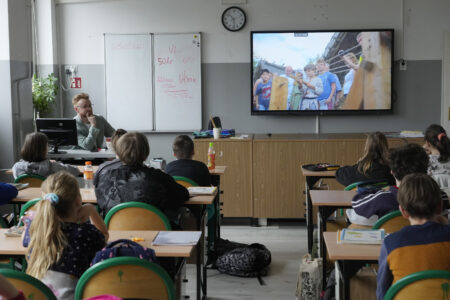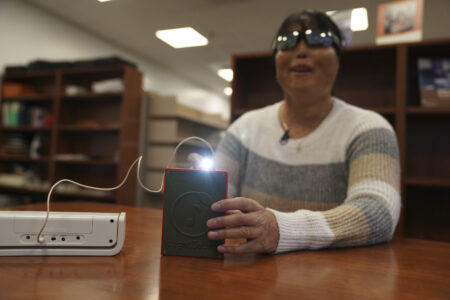Teamwork
NICE superintendent discusses district test scores
- Lily Malette, a third-grader at Aspen Ridge Elementary School, takes a math lesson in the Reflex program at the school. The most recent M-STEP math scores for Aspen Ridge third- and fourth-graders were above the state proficiency average. (Journal photo by Christie Bleck)
- Jack Manier, a third-grader at Aspen Ridge Elementary School, takes a math lesson in the Reflex program at the school. The most recent M-STEP math scores for Aspen Ridge third- and fourth-graders were above the state proficiency average. (Journal photo by Christie Bleck)

Lily Malette, a third-grader at Aspen Ridge Elementary School, takes a math lesson in the Reflex program at the school. The most recent M-STEP math scores for Aspen Ridge third- and fourth-graders were above the state proficiency average. (Journal photo by Christie Bleck)
MARQUETTE — NICE Community Schools Superintendent Bryan DeAugustine believes teamwork is one of the reasons students in the district performed better than the state proficiency averages in the recently released M-STEP and SAT scores.
For this year’s standardized tests, third-graders at Aspen Ridge Elementary School showed a 64.7 percent proficiency in reading compared to the state’s 44.4 percent proficiency. Fourth-graders showed a 58.3 proficiency in reading compared with the state’s 45 percent.
For third-grade math scores, Aspen Ridge students were 63.6 proficient compared with the state’s 45.7 proficiency rate. Aspen Ridge fourth-graders were 55.2 percent proficient in math while 42 percent of students statewide showed proficiency in that subject.
DeAugustine said third- and fourth-grade tests were a culmination of what the students have learned since they came into the school district as kindergartners.
“Our teachers just have their systems wired as a team, so it’s not kind of piecemeal where maybe different teachers are doing things in a different way or a different pace, and I think that’s helping us even with the parts of the tests that we’re worried about,” DeAugustine said. “It’s helping our kids achieve better than the state average.”

Jack Manier, a third-grader at Aspen Ridge Elementary School, takes a math lesson in the Reflex program at the school. The most recent M-STEP math scores for Aspen Ridge third- and fourth-graders were above the state proficiency average. (Journal photo by Christie Bleck)
He also gave credit to the students themselves.
“We have great kids and they’re trying their hardest, and I really think it comes down to our teachers working as teams, and not just in their grade levels but across our lower elementary,” DeAugustine said. “I think that really helps us make a difference.”
Michigan third- and fourth-graders improved slightly on reading and math tests last spring, but those results were among the few bright spots in otherwise disappointing scores, state officials said during late summer, according to an Associated Press story. The results went down in 11 of the 18 subject areas tested in grades 3 through 8 and 11.
“Normally if a vast majority of the kids aren’t doing well on a test, it’s not necessarily the kids’ fault,” DeAugustine said. “It’s something that the educators have done wrong, taught in a way that the kids didn’t understand, or there’s a problem with the assessment itself.”
DeAugustine said NICE staff acknowledges it can be difficult to make good use of standardized tests because the results take so long to get back to districts.
M-STEP tests are given in the spring.
“We don’t ever get to see the tests, which is very odd in education,” DeAugustine said. “Normally you prep the test, you grade it, you see how the kids did on it.”
DeAugustine pointed out that all 11th-graders at Westwood High School take the SAT test, and that includes INN — the Ishpeming-Negaunee-NICE Community Education Division, an alternative school also known as “Hartman High” after its principal, Bill Hartman.
“Our kids who’ve chosen a non-traditional path are forced to take this traditional test also,” he said.
However, DeAugustine noted that Westwood’s SAT average composite score was 1029 compared with the state average of 1003.
“I think that’s because our kids took it seriously,” he said. “We’ve got them working in outside areas like the Khan Academy, which is a really good study aid.”
DeAugustine stressed that NICE staff doesn’t specifically teach to the SAT test, but helps prepare the students so they know what to expect when they take it, plus they can apply the knowledge they’ve accumulated through their school years.
He said staff is a big believer in the Northwest Evaluation Association tests, the results of which are returned within 24 hours and measure growth versus achievement.
DeAugustine also said staff wants to duplicate the results seen in the lower elementary grades across K-12.
Key focus areas are reading and math.
“What we believe is that if we can help our kids be really proficient in English Language Arts and in mathematics, then that translates to other subjects,” DeAugustine said. “Of course, every subject you’re going to read and write and discuss problem sets. In mathematics, that’s going to translate to science and just to logical thinking, so that’s why we really pay very close attention to those, and in third and fourth grade, that’s where you’re building those skills that you’ll take with you throughout your school career.”
Curricula, of course, can help test scores.
Lisa Belpedio, third-grade teacher at Aspen Ridge Elementary School, uses the math program titled Reflex, which allows students to learn at their own levels.
“It kind of goes at their own pace when they answer the question,” Belpedio said.






